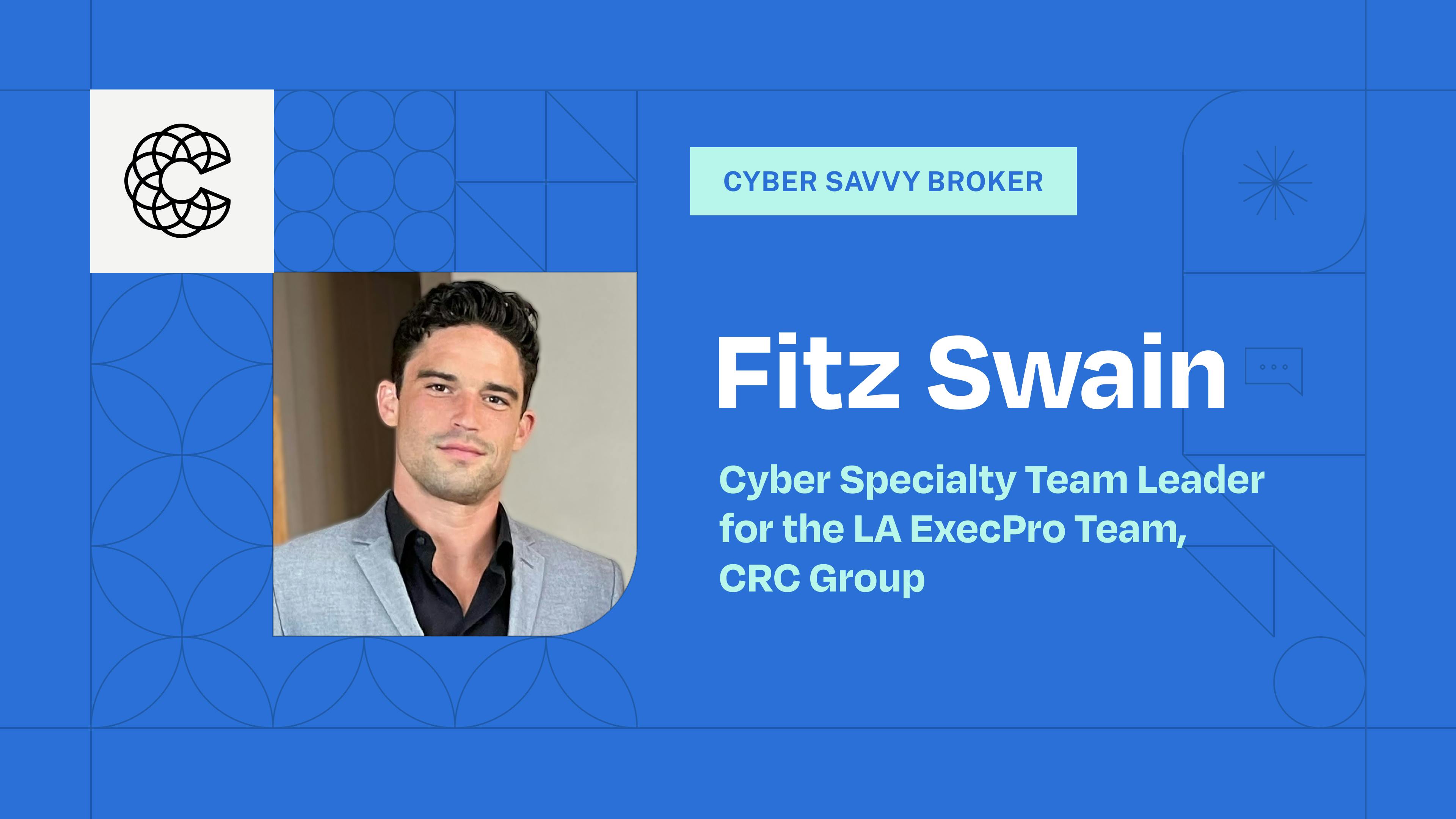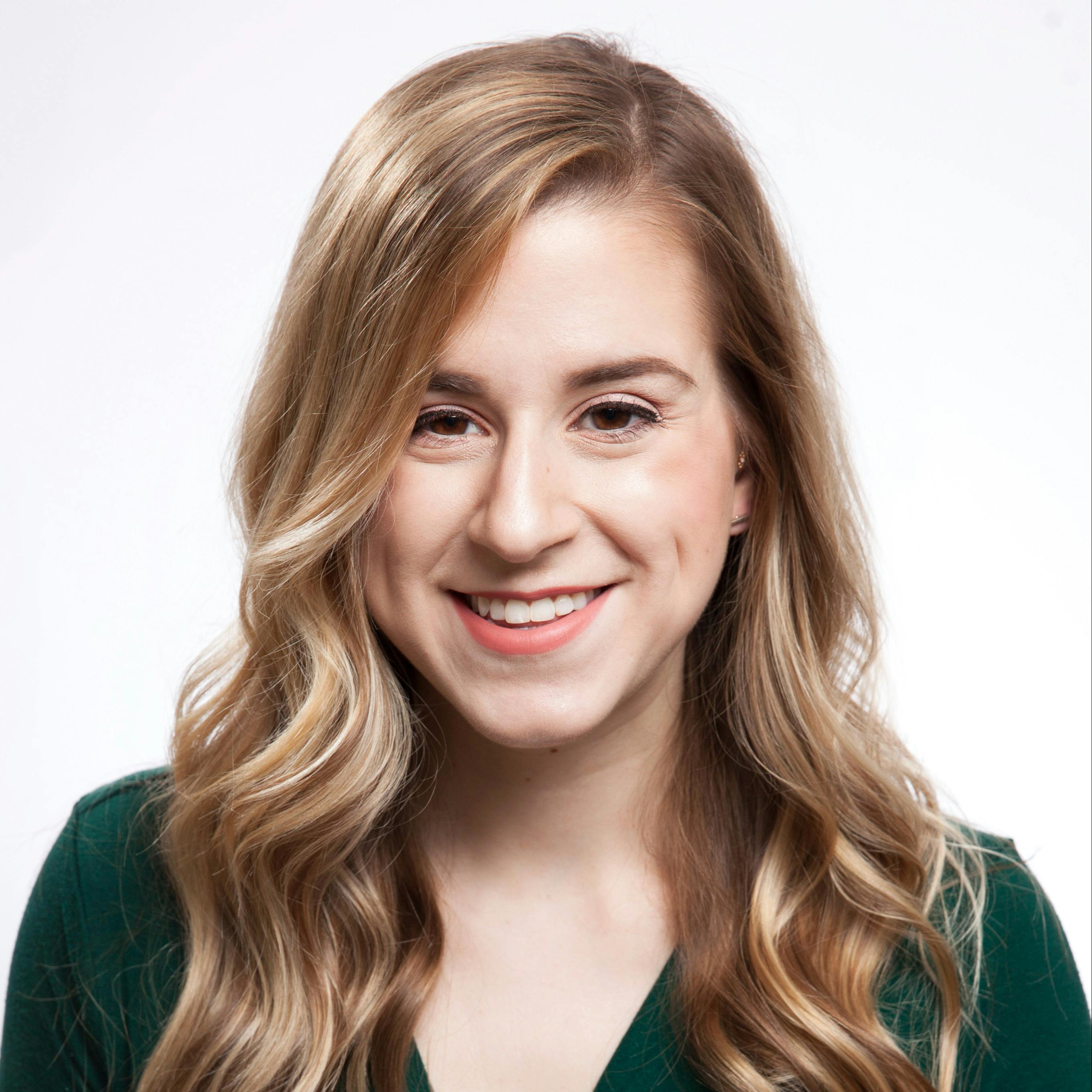Cyber Savvy Broker: Fitz Swain

As technology transforms the economy, businesses of all sizes have to navigate a new kind of risk: digital risk.
The most successful brokers will need to be prepared to help their clients navigate these complex risks. Our "Cyber Savvy Broker" series highlights forward-thinking brokers with the knowledge and skills to help their clients navigate this digital transformation.
Fitz Swain, Cyber Specialty Group Leader for the LA ExecPro Team at CRC Group, joined us for a Q&A session where he shared the unique path he followed to become a cyber insurance specialist. He also detailed the changes he's seen in the industry between the time he left insurance and came back, and explored the biggest challenges the industry faces in the future.
What did you want to be when you grew up, and how did you become a cyber insurance specialist?
Without a doubt, I wanted to be a professional soccer player. My parents are English, so I grew up as a Manchester United fan, and that was all I wanted to do. Unfortunately, in high school, I tweaked my ACL and had to let that dream go.
For my career, honestly, I fell backward into insurance. I feel like everyone has — I don't think many people go to college and say, "I want to sell insurance."
My goal was to work in the entertainment industry. I had a lot of love for the entertainment industry, and when I first started at CRC Group, I worked on the LA ExecPro entertainment team. I was at CRC for two years before I went and worked at Sony Pictures to work in-house risk management, exclusively overseeing their cyber and tech tower.
It was at Sony when I first thought, "Oh, this is actually really cool." Then I realized this was what I enjoyed doing. It was a weird pivot, but I'm quite glad it's led me to the place where I am now – back at CRC running the LA ExecPro cyber specialty group.
What resources did you use to become a cyber insurance specialist?
My greatest resource has been learning from the leaders on the LA ExecPro Team. The Directors on our team have really supported me along the way. I've also learned a lot from my older brother, who was in the insurance business before I joined. He was an underwriter at Hiscox and then a territory manager for Beazley. When I first started on the LA ExecPro team in the entertainment group, I didn't know much about cyber coverages. My brother first piqued my interest in the cyber market, but having worked at Sony Pictures along with the changes in the marketplace, I realized my passion for this sector of our practice. I am very thankful for having the support of our leaders and my brother.
What evolved from the time you first arrived at CRC Insurance and then when you returned?
When I first joined CRC, we were in the softest market possible. You could send out a submission for cyber quotes to 10 markets, and you'd get 10 cyber quotes back. All the coverages were similar and there was no differentiation. Everyone was trying to undercut everyone to win the deal.
Now that I'm back, it is quite the opposite. It's more of a seller's market, and I feel like I'm begging for quotes and hustling to try to get a deal done. Nothing just falls in my inbox, which is the biggest difference. You have to really get to know the market, the decision makers and pick up the phone to negotiate.
Coalition was the first provider that was really willing to get creative and start adding coinsurance, supplements, and much more until the proper security controls were in place.
They also offer additional risk services that benefit a smaller company. So, outsourcing those risk management services to Coalition is a huge selling point. It's something I've been able to lean on, and it's helped CRC get a lot of deals.
What skills are essential for brokers to be cyber savvy in today's market?
It starts with understanding your insured and the coverages that will impact your clients the most. You have to understand exactly what a policy covers because many providers use different terms for different things. It matters that you know and understand exactly what each carrier means when they use a specific term.
In addition to that, an even bigger skill is understanding what cybersecurity controls actually do. It's been such a hard market, and everyone is relying on these security controls to get cyber coverage. When an insured asks, "Why do I need MFA?" I need to be able to explain the security controls to them — what it is and how it protects them — it's how I build my reputation as an advisor.
Where do you find motivation?
For lack of a better way to say this, and as corny as it may sound, I love binding deals. I love getting deals done. There's a euphoric rush about it.
I also have a bit of a short attention span, and in the insurance industry (especially in the wholesale world), you have ten days to get something done. It's a constant hustle, and I've always been a fan of that. I thrive on it. I also love finding a solution to someone's problem. When I bind a policy with an insured, it feels good knowing they're protected from a catastrophic loss that could put them out of business.
What does the insurance industry need to do to evolve for the future?
There needs to be better training for the new people coming into insurance. It's extremely difficult right now. We need more talent in general. It's very challenging to find good talent, especially those who know cyber well.
People can often be so inundated with business that sitting down with someone and teaching them everything they need to know to be successful is not easy. However, I do believe that it's better to hire people who have a little bit less experience so they can grow into their role.
The LA ExecPro team really focuses on training. The leaders on our team are all involved with the training process and focus on helping new hires learn and grow from the experience we’ve gained over the years. Jay Horoshak and David Alferez really take the time to pass on their years of experience and expertise to all of us. I think there's an aspect to it that you can't learn theoretically, and it's the real hustle of the business where you learn how it all works. If you can bring someone in who doesn't know a ton but they're willing to hustle, you can teach them what they need to know.
I don't think people outside of insurance realize that in today's market, it's challenging to bind quotes, and you have to work very hard and understand security controls, or you're not going to be successful. So it's very obvious when you aren't doing these things, and you won't bind quotes for insureds.
In your opinion, what makes a broker "cyber savvy"?
Being cyber savvy means knowing your market appetite very well. It’s critical to respect people's time. If you get a submission, it’s knowing that you should not send it to 50 markets because 25 can't look at it due to various reasons. This immediately puts you ahead of other people because you're not wasting anyone's time. Insurers are not interested in sending out 50 declinations a day. They prefer to look at accounts they can actually review without wasting underwriters' time.
Improve your cyber knowledge with Coalition
Cyber insurance is one of the fastest-growing insurance products and a huge opportunity for brokers to grow their book of business. Coalition's Cyber Savvy program equips you with the tools and knowledge you need to deepen your cyber risk expertise and advise (and protect!) your clients.
You can access more free Cyber Savvy Broker resources to continue your learning journey.







